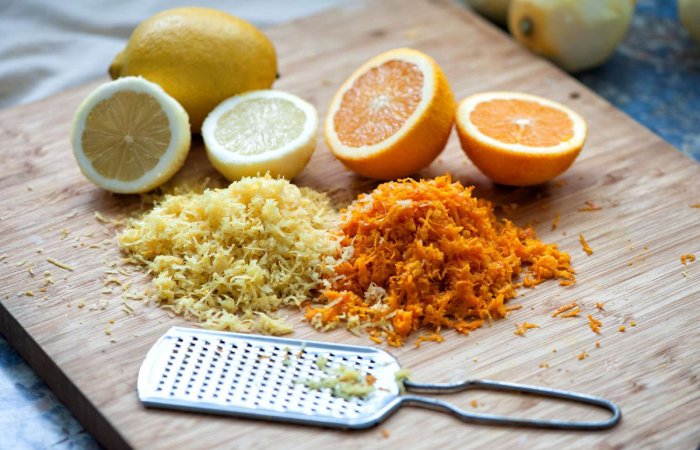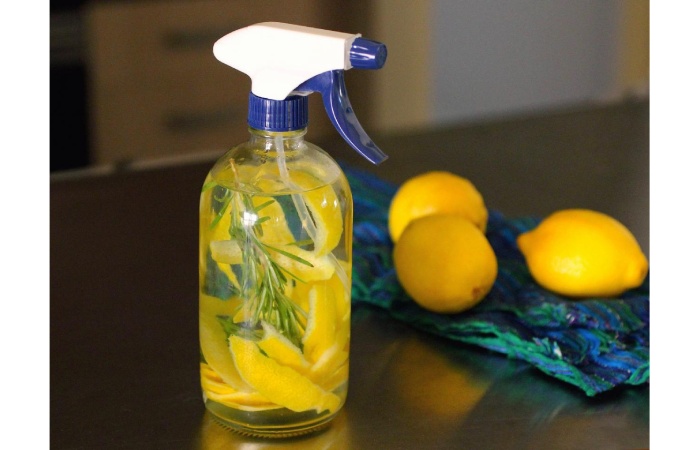Citrus season is upon us! Yes, you read that right zest your citrus: citrus fruits are one of the few agricultural products that grow in season during the winter in the United States. And while you won’t find lemons and limes growing under the snow in the northern parts of the country, oranges, lemons, limes, grapefruits, and most other citrus fruits you can imagine are harvested sometime between late October and March in warmer parts of the United States like Arizona, California, Florida, and Texas.
The juice or pulp of these tart fruits is most often eaten, while the shell or peel ends up in the trash (or, ideally, the compost bin). However, citrus zest (the brightly coloured part of the citrus peel) is a priceless part of the fruit, as it contains many essential oils and nutrients.
Not only is this valuable part of the fruit a delicious addition to various recipes, but it can also support overall health and be used in many homemade cleaning products and household items. Here are some surprising reasons why you should always zest your citrus fruits.
10 Reasons to Always Zest Your Citrus Fruits

“Citrus zest, or the vibrant outer rind of oranges, lemons, or limes, is more than just a burst of flavour: It’s a powerhouse of nutrients. Citrus peels make up nearly half of the total weight of the fruit and are a rich source of bioactive compounds, especially flavonoids, which provide numerous health benefits,” says Samina Kalloo, RDN.
Invest in a Microplane, citrus zester, or vegetable peeler to start reaping the benefits of citrus zest. Be sure not to overdo it by removing the bitter white part of the peel and the zest when using these tools.
Improves Immune Health
According to the USDA database, lemon peel contains significant fibre, calcium, potassium, and vitamin C. It also contains phytonutrients, including phenolic compounds like flavonoids and essential oils like D-limonene zest your citrus. While this nutritional profile is specific to lemon, almost all citrus peels have similar dietary data.
The vitamin C, plant compounds, and essential oils in citrus peels act as antioxidants that help reduce inflammation and prevent the formation of disease-causing free radical molecules by significantly stimulating the immune response zest your citrus.
Promotes Oral Health
Another significant benefit of the nutrients found in citrus peels is that many have antimicrobial properties that may be especially effective against some problematic bacteria in the mouth. An older study published in 2011 in the Journal of Food Science and Technology identified four different active compounds in the lemon peel that showed antibacterial activity and were particularly effective against bacteria responsible for dental problems such as tooth decay and periodontitis zest your citrus.
SpanishPromotes Gut Health
Combining fibre and D-limonene in citrus fruits also helps improve gut and digestive health. A 2019 animal study published in the Phytomedicine journal found that D-limonene, present in citrus peel, supports gastrointestinal (GI) health by increasing mucus production and reducing inflammation and gastrointestinal oxidative stress.
“In addition, the citrus peel contains a small amount of fibre, which aids digestion,” says Kalloo. This modest amount of fibre, combined with the flavonoids in this vibrant flavour, acts as prebiotics that feed the healthy bacteria already in the gut microbiome zest your citrus. This promotes better digestion and potentially alleviates gastrointestinal issues like gas, bloating, and constipation.
Promotes Heart and Metabolic Health

“The flavonoids and plant compounds found in citrus peels also promote optimal heart health,” explains Kalloo. This is mainly due to its powerful anti-inflammatory properties zest your citrus.
However, flavonoids help prevent heart disease and protect metabolic health through their anti-diabetic properties3, such as regulating blood sugar and lipid levels.
Promotes Healthy Skin Zest Your Citrus
The vitamin C found in citrus peels also positively impacts skin health. “The vitamin C found in the peels of these fruits helps promote collagen production for healthy skin and tissue,” says Kalloo.
Additionally, vitamin C can protect against the damaging effects of ultraviolet (UV) light thanks to its antioxidant properties zest your citrus.
Reduce Food Waste
Food waste is a substantial environmental problem worldwide, with 30 to 40 per cent of the world’s food supply being wasted or thrown away each year zest your citrus.
And while peeling or zesting citrus fruits may not seem like a big deal, every little bit counts. “Using the peel is a great way to use the entire fruit, especially the part that would otherwise be thrown away as food waste,” says Kalloo.
Adds Flavor to Dishes Zest Your Citrus
This is because the essential oils in citrus peels have a more citrusy flavour than the juice, especially when baked or cooked. Plus, the ingredients pair well with both sweet and savoury dishes.
“In addition to using citrus peels as a garnish, some of my favourite ways include adding it to water, iced tea, or baked goods like muffins and quick bread,” says Kalloo. Some people also like mixing salt or sugar with citrus zest to sprinkle over proteins, roasted vegetables, or line cocktail glasses. However, the ingredient is also helpful in pasta, stews, soups, and marinades. “Keep in mind, though, that since the peel flavour is strong, a small amount is all it takes,” adds Kalloo.
Makes Homemade Cleaners Effective Zest Your Citrus

If you’re looking to save money and avoid some of the worrisome chemicals in many conventional cleaners, citrus peels can help. “Since peels have natural antimicrobial properties, you can use them to create natural cleaning solutions or even make a homemade scrub,” explains Kalloo. “For easy cleaning, combine one cup of baking soda, 1/4 cup of vinegar, and one to two tablespoons of citrus zest. Mix into a paste and scrub countertops, sinks, or tubs for a fresh, natural clean.”
Deodorize Naturally
While citrus peels impart the most delicious scent, they also help naturally deodorize surfaces around the home. “Another great use for this common waste product is to put citrus peels in or under trash bags for a natural, fresh scent that can be changed every few days,” says Kalloo.
Many people also rub dirty cutting boards with squeezed lemon zest to deodorize them before washing; you can even throw them down the garbage disposal to clean and eliminate unpleasant odours.
Easy to Store
Finally, there’s no reason not to zest citrus fruits, as they’re super easy to store for long periods, especially if you won’t use them immediately or only need the citrus juice for a specific recipe. This gives you access to the benefits of citrus zest whenever you need it. ”
An easy way to store it is to place unused zest on parchment paper and freeze until solid. Then transfer it to a reusable freezer bag and store it in the freezer until you need it,” says Kalloo zest your citrus.


